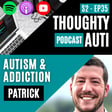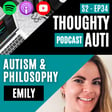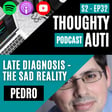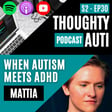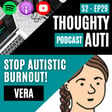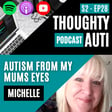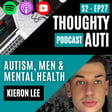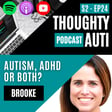
Your Child Is Autistic, What Now? - How To Become A Parent Advocate w/Michelle Rogers
What are the stages of processing a diagnosis? What are common mistakes parents make with autistic children? How can a parent be their child's advocate? Is there a 'one size fits all' approach to teaching autistic children?
In this episode of the Thoughty Auti Podcast, Thomas Henley talks to Michelle Rogers - A parent advocate with an online support service for NEW autistic parents
They start by discussing how Michelles own child was diagnosed, highlighting the common pitfalls of being an 'autism parent'. Thomas draws on his prior knowledge of the big diet scams and money draining quick-fix's that often draw in new parents.... wanting to CURE their child!
Both highlight the importance of avoiding the 'cure' mentality, spending time with your child, learning about them, learning about autism, and developing your own tailored strategy to parenting. Michelle believes it's a case of having the right mindset, being very aware/in-tune with your child's emotions and needs, but also doing your own research.
One of the biggest barriers to autism parents and autistic people getting along... is the choice of teaching method. Many autistic adults remark on the brutality of one particular therapy, and trauma they received from that therapeutic pathway. With Thomas's time as a special needs teaching assistant and having a highly successful SEN teacher as a mother, he believes the BEST choice is to pick and choose what works for each child... putting your child's emotional health first.
So is it the case that treatments have developed a more sensitive approach, or does it depend on the practitioner? How do you access Early Intervention services... and should you? How can you avoid the pitfalls and become the best autism parent you can be?
Let's talk.
If you have an exciting or interesting story and want to appear on the next podcast, please contact me at: aspergersgrowth@gmail.com
Michelle's Links:-
https://instabio.cc/michellebrogers
▬▬▬▬▬▬▬▬▬▬▬▬▬▬▬▬▬▬▬▬▬▬▬▬▬▬▬▬▬
Channel Merchandise - https://teespring.com/stores/aspergers-growth
Support via Patreon! - https://www.patreon.com/aspergersgrowth
Social Media ♥ -
☼ Facebook - Aspergers Growth
☼ Twitter/Instagram - @aspergersgrowth
♫ Listen On -
Spotify - https://open.spotify.com/show/6vjXgCB7Q3FwtQ2YqPjnEV
Apple Podcasts - https://podcasts.apple.com/gb/podcast/thoughty-auti-the-autism-mental-health-podcast/id1470689079
Music -
♫ Track: [Chill Music] Ikson - Reverie [No Copyright Music]
Advert Track: Empty Parking Lot - Colours Of Illusion [Epidemic Sound]








